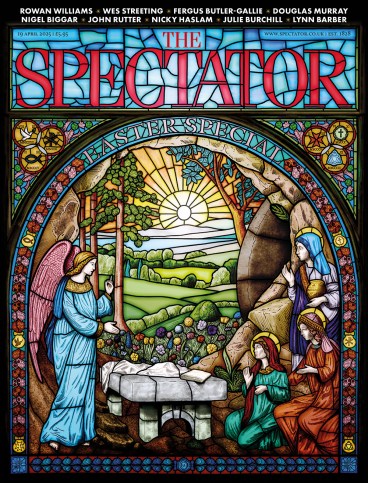
He’s not the messiah
Sir: To Freddy Gray’s meticulous dissection of Trumpian chaos theory (‘Shock tactics’, 12 April) I would add one element: religion. Donald Trump seems to believe the blood he spilt in the failed assassination attempt anointed him his country’s Redeemer: ‘I was saved by God to make America great again.’ Messiahs look to a higher authority than rational argument. Whatever ideas pop into the President’s head he judges right by definition. Tariffs will achieve miracles and wars will cease at his command. There is a strong Gnostic element to this cult, its followers believing Trump has some secret knowledge guiding his apparently wayward actions. To keep him in check, the rest of us will have to put our trust in the bond markets.
Francis Bown
London E3
Botched job
Sir: Andrew Lewis’s article on jobseeking hit home for me (‘Role play’, 12 April). I was made redundant in 2010 at the age of 57. During my career I had been exposed multiple times to the tender mercies of the border forces of the USA, Russia and China; however, I have never been handled so rudely as I was at the Jobcentre in Bromley. If you arrived minutes early for your appointment, you were made to stand out in the rain or snow. If I read job adverts in my newspaper while waiting, I was told off and informed I could only use their job adverts kiosk. Their kiosk was pretty useless; you selected the postcode areas of interest, so I went for CR (Croydon) and BR (Bromley). Unfortunately, whoever loaded the jobs thought BR was Bristol (BS), so I got all the Bristol jobs, and no one knew how to correct it. I was offered a CV-writing course and, as I’d not had a job interview since 1984, I accepted. When attending I was told this was the last month the course would be offered, due to cutbacks.
I used my time in the Jobcentre constructively, helping my interviewer write her son’s university application personal statement so she could get him out of Lewisham – he did get into Durham University. The only job I was offered was stacking shelves in Sainsbury’s.
Keith Appleyard
West Wickham, Bromley
A good egg
Sir: Petroc Trelawny (Diary, 12 April) writes of the demise of oeufs en gelée in British restaurants. May I point him towards Maison François in Duke Street, St James’s, where he will find the perfect example on the menu. I have one every time I go there.
Sir Charles Blomefield
Chipping Campden, Gloucestershire
Funeral march
Sir: Regarding Charles Moore’s observation about Britain’s increasingly delayed funerals (Notes, 12 April), I am constantly surprised – as an Irish emigrant of long standing – about two aspects of the English way of death. One, the gap between the passing of a loved one and the interment, and two, the reluctance of most Britons to view the remains of their relatives.
In Ireland it is still a ritual to either attend the funeral two days after the death or the removal of the remains within 24 hours. The conveying of the corpse from the home or hospital chapel of rest involves the viewing of the remains in an open coffin before the lid is sealed and the dear departed transferred to the church or crematorium. My late mother relished the ritual, often remarking, somewhat illogically, on the apparently healthy demeanour of her dead neighbour or golfing partner.
Before the Irish famine, I’m told the gap between death and interment was about a week. The Catholic Church shortened it to 48 hours after a nationwide outbreak of faction fights triggered among the starving mourners by infusions of poiteen.
John McEntee
London SW19
All that’s sacred
Sir: The Revd Jamie Franklin’s appreciation of medieval churches is admirable (‘Foolish naves’, 5 April). Less so is the demand that his faith minority should dictate their possible re-use. It is estimated that some 5,000 of these magnificent buildings lie bleak, empty and actually or virtually redundant. As ever more become vacant and unused, this nonsense must be addressed. Parish churches were once the bustling focus, civic and social, of local England. They should become that again, as some already are where villages are losing their shops, pubs, schools and other places of congregation. They should pass to local community trusts, able to levy a modest precept for their upkeep. Franklin wants to ban other uses and recover ‘tranquillity and sacredness’. He should find these elsewhere. Thousands of lovers of these buildings are struggling to save them. They know that in the Church’s care their only tranquillity is in the grave.
Simon Jenkins, author of England’s Thousand Best Churches
London W8
Fake views
Sir: Nicholas Wightwick argues that the National Trust is correct in choosing not to rebuild historic buildings destroyed by fire, such as Clandon Park or Uppark, preferring instead that they be retained as ruins (Letters, 12 April). Restoring a fine building to its former state is not to build a ‘fake’, as he suggests, but to create a lasting monument to today’s artists and craftsmen to be enjoyed in the centuries to come. In this way, it should give almost as much pleasure to future generations as did the original. Would he truly have preferred to retain, as ruins, St George’s Hall and dozens of rooms at Windsor Castle, or the shell of Notre-Dame cathedral in Paris, rather than to see them fully and exquisitely restored after their disastrous fires to the benefit and wonder of present and future generations? I very much doubt it: but, if so, I fear he must be pretty much alone in his views.
Richard Longfield
Weston Patrick, Hampshire








Comments